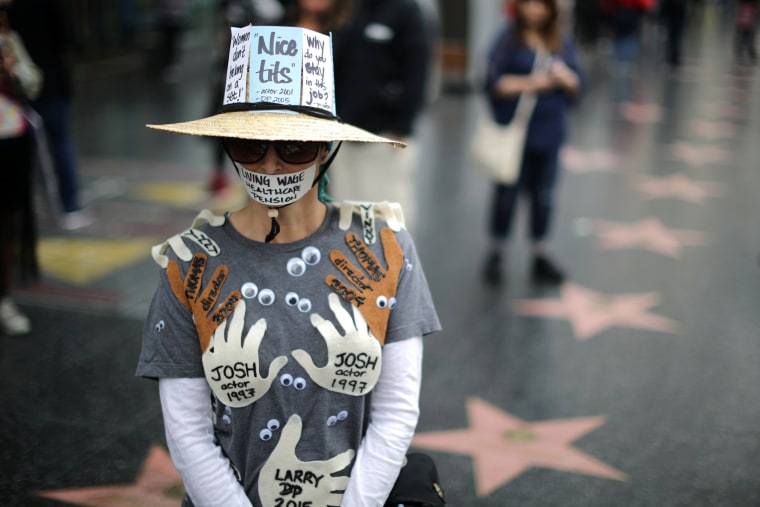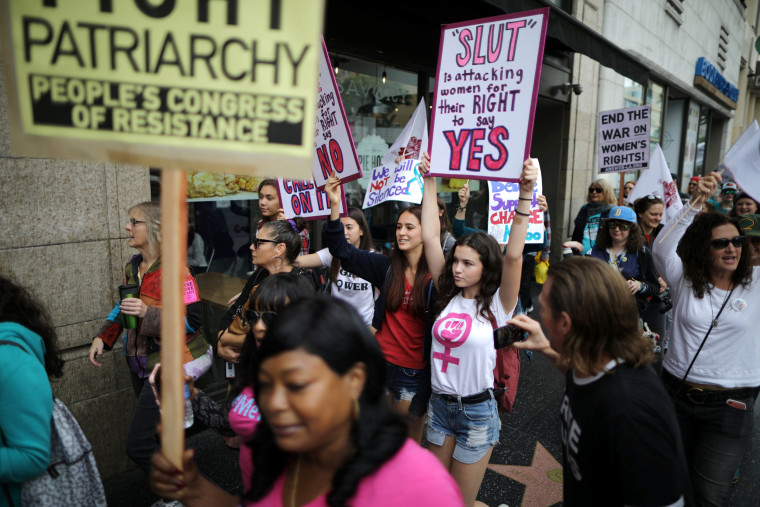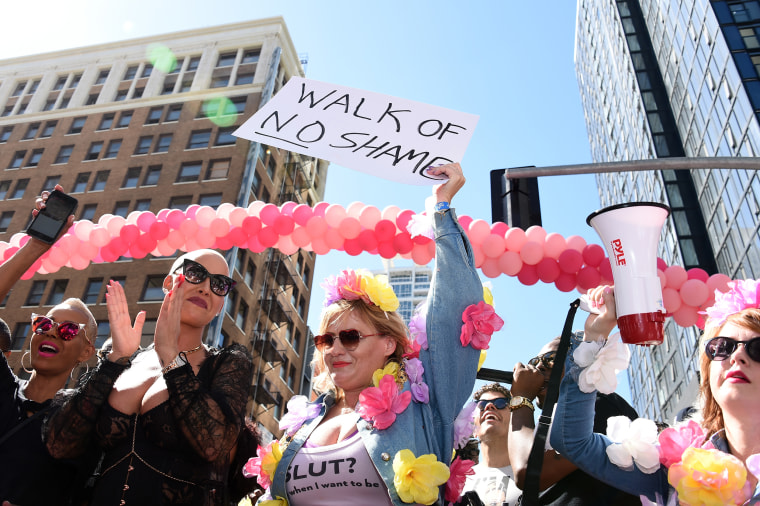The current feminist moment is becoming marked by, among other things, an excess of intergenerational disrespect on all sides. Just in the last week, 78-year-old Margaret Atwood painted herself as the victim of a witch hunt by younger feminists, and 22-year-old writer Katie Way condescended mightily to veteran CNN journalist Ashleigh Banfield, because Banfield treated another young self-identified feminist shabbily on the air.
The phrase “second wave feminism” (which historically refers to activists in the 1960s and 70s) is suddenly being used as an epithet against any woman over 40, including those who came of age, as I did, during the “third wave” that began in the 1990s. Today’s young feminists are right to criticize their white, middle-class predecessors for an overall lack of intersectional analysis and inclusivity, but I can’t help noting the casual ageism (i.e., a lack of intersectional analysis) inherent in collapsing the multi-pronged activism of several generations into one easily-dismissed “wave” of outmoded thought. And that's without mentioning the careless erasure of older radical women of color, whose work was as much a part of the actual second wave as Gloria Steinem donning a Playboy bunny costume or Betty Friedan trying to distance herself from lesbians.

Watching the #MeToo movement unfold has been my first clear signal that I am now part of a generation whose practice of feminism is not always relevant to younger women. I’m aware, of course, that I don't always live up to the latest ideals of the movement: I often forget to introduce myself with pronouns, I can’t break the habit of addressing mixed-gender groups as “you guys” and I stumble over the pronunciation of “Latinx.” But a slow, clumsy adoption of changing language is to be expected in middle age. What I wasn’t prepared for was being schooled in a subject on which I literally wrote the book.
In "Asking for It: The Alarming Rise of Rape Culture — and What We Can Do About It," I wrote that I believe young feminist activists “will move us from a rape culture to one that respects women’s autonomy, takes sexual violence against any person seriously, and holds perpetrators accountable.” In principle, I still believe every word; in practice, recent events have challenged me.
Nearly every feminist I know over 40 was spooked earlier this week when a relatively new publication by and for young women ran a long piece in which the subject accused a celebrity of what she considered to be sexual assault, based on a detailed account of what many of us initially perceived as no more or less than a terrible date with an entitled, selfish, pushy man. “This is it,” we said to each other on private e-mail lists and locked Facebook posts. “This is all the ammo 'they' need to end #MeToo.”
Feminists of my generation and older have, for years, been accused of overreacting, of labeling every little touch “sexual assault,” as we attempted to force society to grapple with the existence (let alone prosecutability) of acquaintance or "date" rape.
Feminists of my generation and older have, for years, been accused of overreacting, of labeling every little touch “sexual assault,” as we attempted to force society to grapple with the existence (let alone prosecutability) of acquaintance or "date" rape. We have heard, time and again, that our insistence on affirmative, ongoing consent as the baseline for any sexual encounter would criminalize perfectly normal male behavior, ruin lives and threaten masculinity itself.
And so, many of us reflexively tried to distance ourselves from this young woman’s use of the phrase "sexual assault" to describe an encounter that sounded coercive and demeaning but not quite criminal. In our fear of losing what ground we’ve gained in the fight against sexual harassment and violence, we caught ourselves saying things that could just as easily have come from antifeminist trolls, like Why didn’t she leave earlier? and What did she expect?. As soon as one woman let something like that slip in private conversation, another would rightly admonish her for victim-blaming, but the words were out there.
We all knew better; we’ve campaigned and lectured and written about affirmative consent. We recognized that a man who publicly claims to respect women had done something terrible to this one. But credibility is such precious currency to those of us who have been public feminists for any length of time; we were terrified of squandering it on an ambiguous case. What if supporting her brought the whole thing crashing down, and society went right back to the old default position of not believing women?
Then I remembered being a young feminist myself.

After I was raped in 1992, I lost count of how often I heard the grating “It wasn’t your fault” and “You have nothing to be ashamed of” from well-meaning supporters: my roommate, our R.A., the doctor and nurses in the emergency room I went to the next morning, college officials who took my complaint. Those reassurances were simply what you said to rape survivors — as I was taught by the same people to call myself — in 1992. Yet they never quite resonated with me, a woman born in the same year Susan Brownmiller published her landmark book "Against Our Will," and raised on after-school specials. To my 17-year-old mind, of course it wasn’t my fault. Rape, by definition, is not the victim’s fault, and if it’s not your fault, you have nothing to be ashamed of.
It would be years before I understood how desperately the women born before me needed to hear those exact phrases, over and over, until it sank in. When those women marshaled the courage to name the abuses they suffered at the hands of men, and give future generations a language with which to discuss them — “domestic violence,” “sexual harassment,” “sexual assault,” “acquaintance rape,” “rape culture” — they didn’t have decades’ worth of feminist theory and research to help counter the broad understanding that they had somehow invited their own abuse. They didn’t have degrees in Women’s and Gender Studies; those fields of study only came into existence after 20th-century feminists created them.
What they did have was their testimony — what young feminists are increasingly calling "their truth"— and an ability to recognize patterns of behavior to which many other women were also subjected. Some of them were generous enough to write down what they knew, teach others and pass their wisdom to the next generation, so that girls like me could grow up taking it for granted that rape is only the fault of rapists, and there is no such thing as “asking for it."
Even if they don't fully realize where it all came from, it's clear that today's young feminists have taken the anti-rape lessons of the second and third waves — only yes means yes, coercion is not consent, consent can be withdrawn at any time — very much to heart.
Even if they don't fully realize where it all came from, it's clear that today's young feminists have taken the anti-rape lessons of the second and third waves — only yes means yes, coercion is not consent, consent can be withdrawn at any time — very much to heart. They understand those principles in the same bone-deep way that I understood that being raped was not my fault, because they came of age hearing them as established truth. They have entered and are entering adulthood with much higher expectations than we had for bodily autonomy, for the right to sexual pleasure, and for respect for their boundaries. Whatever intergenerational tension this difference in our expectations produces, it can only be cause for celebration.
Perhaps the single most astonishing thing to longtime feminists about the #MeToo movement is that it’s still going strong, months after it first went viral. Based on past experience, I never would have predicted that the rallying cry, first used by activist Tarana Burke several years ago, could explode into a serious, ongoing movement, animating this weekend’s women’s marches and inspiring Hollywood millionaires to dialogue with farmworkers about how best to fight systemic sexual harassment in the workplace.
Historically, for every feminist achievement there has been an equal and opposite backlash. For every Time cover devoted to victims breaking their silence, there’s an Atlantic or Harper’s article asking whether we’ve taken this trusting women business just a smidge too far. Usually, that’s enough to change the national conversation back to something more status quo-friendly.
But this time, even with the same old people writing the same old articles that recycle the same old coded victim-blaming, the conversation isn’t going away. Instead, it’s going deeper and getting messier, causing people to question long-held beliefs — as it must if real progress is the goal. However uncomfortable it may be to see feminists publicly snipe at each other like frustrated mothers and daughters, these conflicts are so much better than not talking about it at all.
Kate Harding is the author of "Asking for It: The Alarming Rise of Rape Culture—and What We Can Do About It" and the co-editor of "Nasty Women: Feminism, Resistance, and Revolution in Trump's America."

